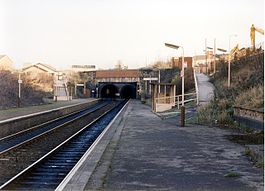Farnworth railway station
| Farnworth |
|
|---|---|
 |
|
| Location | |
| Place | Farnworth |
| Local authority | Bolton |
| Coordinates | 53°33′01″N 2°23′18″W / 53.5503°N 2.3882°WCoordinates: 53°33′01″N 2°23′18″W / 53.5503°N 2.3882°W |
| Grid reference | SD743060 |
| Operations | |
| Station code | FNW |
| Managed by | Northern |
| Number of platforms | 2 |
| DfT category | E |
| Live arrivals/departures, station information and onward connections from National Rail Enquiries |
|
| Annual rail passenger usage* | |
| 2011/12 |
|
| 2012/13 |
|
| 2013/14 |
|
| 2014/15 |
|
| 2015/16 |
|
| Passenger Transport Executive | |
| PTE | Greater Manchester |
| History | |
| Original company | Manchester, Bolton and Bury Railway |
| Pre-grouping | Lancashire and Yorkshire Railway |
| Post-grouping | London, Midland and Scottish Railway |
| 29 May 1838 | Station opened as Tunnel |
| 1841 | Station closed |
| September 1845 | Reopened as Halshaw Moor |
| May 1852 | Renamed Halshaw Moor and Farnworth |
| January 1870 | Renamed Farnworth and Halshaw Moor |
| 6 May 1974 | Renamed Farnworth |
| National Rail – UK railway stations | |
| * Annual estimated passenger usage based on sales of tickets in stated financial year(s) which end or originate at Farnworth from Office of Rail and Road statistics. Methodology may vary year on year. | |
|
|
|
Farnworth railway station serves the Greater Manchester town of Farnworth, in the Metropolitan Borough of Bolton, England. The station has had several names, the present name being adopted on 6 May 1974.
It lies on the Manchester-Preston Line 8 1⁄2 miles (13.7 km) north of Manchester Victoria, though only local services run by Northern call here.
The station received a minor upgrade in 2009, with the addition of automated electronic information display systems and automated announcements audio system similar to the system at . The station has a ticket office, which is manned from 06:30 to 13:00 on weekdays only (closed Saturdays and Sundays). Outside of these times, tickets must be purchased on the train or prior to travel. Step-free access to both platforms is via ramps from the station entrance.
The station was first opened by the Manchester, Bolton and Bury Railway on 29 May 1838, and was originally named Tunnel. This station closed in 1841, but was reopened in September 1845, when it took the name of Halshaw Moor. In May 1852 it was renamed Halshaw Moor and Farnworth; in January 1870 Farnworth and Halshaw Moor; and finally on 6 May 1974 it became Farnworth.
To the south-east of the station is Farnworth Tunnel, which has two single-track bores, although when built it had one double-track bore. Originally there was intended to be a cutting, but a tunnel was substituted. This was dug from both ends and also from a shaft at the centre; the main difficulty in construction being the nature of the ground, which consisted of wet sand and clay. It is 295 yards (270 m) long.
The Lancashire and Yorkshire Railway (L&YR) route north from Blackburn to Hellifield was completed on 1 June 1880, and the Midland Railway (MR) proposed to use this route for a through service between Manchester Victoria and Scotland. The MR intended to use Pullman cars, which were larger than the L&YR coaches, and it was found that some of the tunnels on the route were too small and would need to be enlarged. Among these was Farnworth tunnel, which was also in need of extensive repairs; so instead of enlarging it, it was decided to build a second tunnel alongside. The present down (northbound) single-line tunnel was commenced on 26 April 1880 and brought into use on 5 December that year, although Parliamentary approval for its construction had not been obtained: it was applied for in February 1881 and granted retrospectively (as part of the Lancashire and Yorkshire Railway Act 1881, 44 & 45 Vic chapter 135) on 18 July that year. Once it was in use, the two tracks through the original tunnel were replaced by a single track along the centre; the tunnel lining was repaired and thickened, and this tunnel then formed the up (southbound) single-line tunnel.
...
Wikipedia
